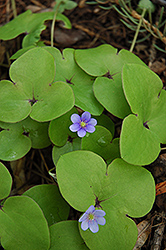It's all about ...
plants

Plant Height: 4 inches
Flower Height: 6 inches
Spacing: 5 inches
Sunlight:
![]()
![]()
Hardiness Zone: 4a
Other Names: Liver Leaf
Description:
A slow growing, semi-evergreen variety producing weather resistant violet-blue flowers in the early spring; an undemanding addition to beds, borders, rocks gardens and containers; provides a pop of color when needed most; low maintenance
Ornamental Features
European Liverleaf has white flowers with yellow eyes and plum purple centers at the ends of the stems in mid spring, which are interesting on close inspection. Its lobed leaves remain light green in colour throughout the year.
Landscape Attributes
European Liverleaf is an herbaceous evergreen perennial with a ground-hugging habit of growth. Its medium texture blends into the garden, but can always be balanced by a couple of finer or coarser plants for an effective composition.
This is a relatively low maintenance plant, and usually looks its best without pruning, although it will tolerate pruning. Deer don't particularly care for this plant and will usually leave it alone in favor of tastier treats. It has no significant negative characteristics.
European Liverleaf is recommended for the following landscape applications;
- Mass Planting
- Rock/Alpine Gardens
- Border Edging
- General Garden Use
- Container Planting
Planting & Growing
European Liverleaf will grow to be only 4 inches tall at maturity extending to 6 inches tall with the flowers, with a spread of 6 inches. When grown in masses or used as a bedding plant, individual plants should be spaced approximately 5 inches apart. Its foliage tends to remain low and dense right to the ground. It grows at a slow rate, and under ideal conditions can be expected to live for approximately 5 years. As an evegreen perennial, this plant will typically keep its form and foliage year-round.
This plant does best in partial shade to shade. It requires an evenly moist well-drained soil for optimal growth, but will die in standing water. It is particular about its soil conditions, with a strong preference for clay, alkaline soils. It is quite intolerant of urban pollution, therefore inner city or urban streetside plantings are best avoided. Consider applying a thick mulch around the root zone in both summer and winter to conserve soil moisture and protect it in exposed locations or colder microclimates. This species is native to parts of North America, and parts of it are known to be toxic to humans and animals, so care should be exercised in planting it around children and pets. It can be propagated by division.
European Liverleaf is a fine choice for the garden, but it is also a good selection for planting in outdoor pots and containers. Because of its spreading habit of growth, it is ideally suited for use as a 'spiller' in the 'spiller-thriller-filler' container combination; plant it near the edges where it can spill gracefully over the pot. Note that when growing plants in outdoor containers and baskets, they may require more frequent waterings than they would in the yard or garden. Be aware that in our climate, most plants cannot be expected to survive the winter if left in containers outdoors, and this plant is no exception. Contact our experts for more information on how to protect it over the winter months.
This plant is not reliably hardy in our region, and certain restrictions may apply; contact the store for more information.
